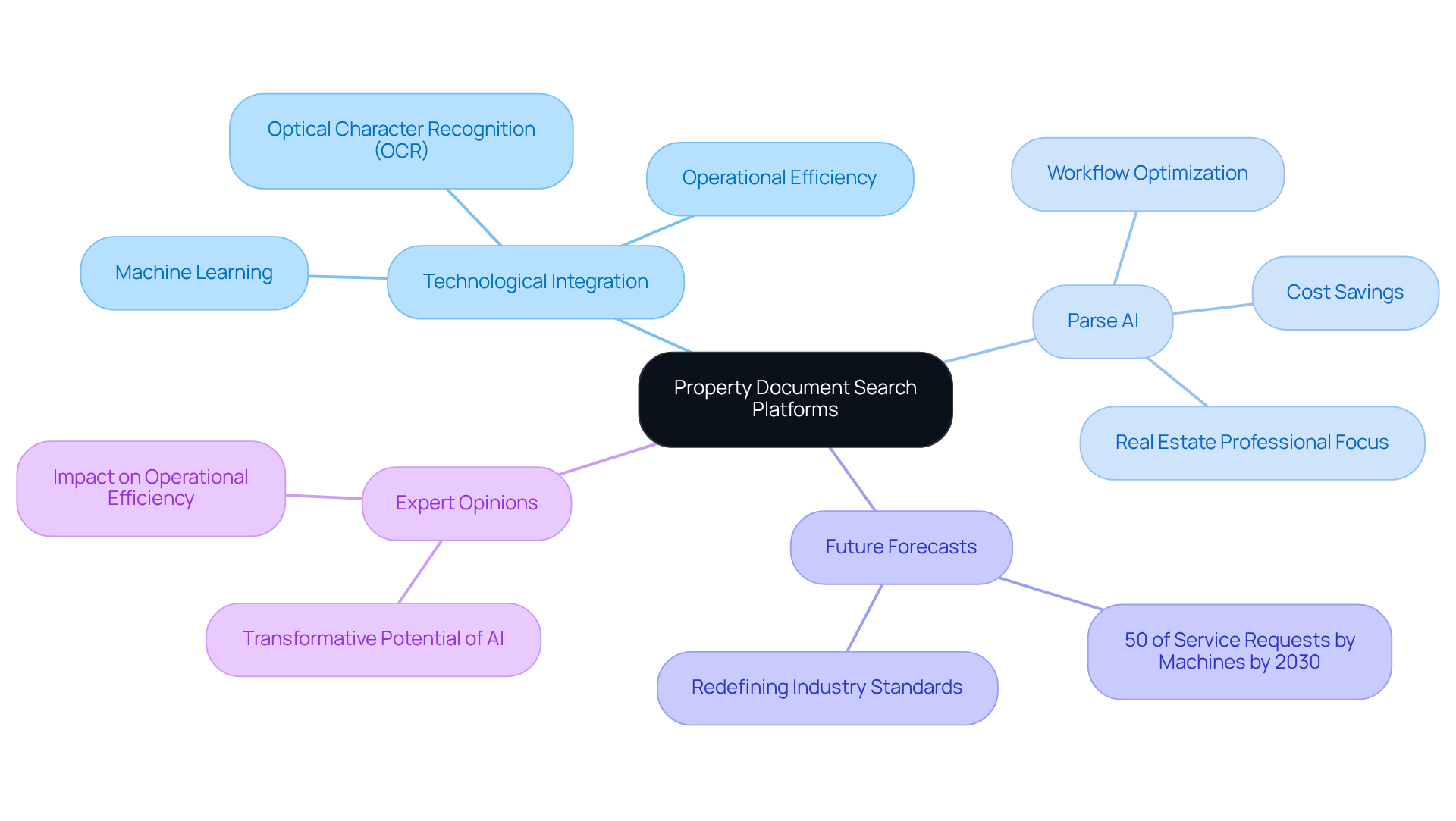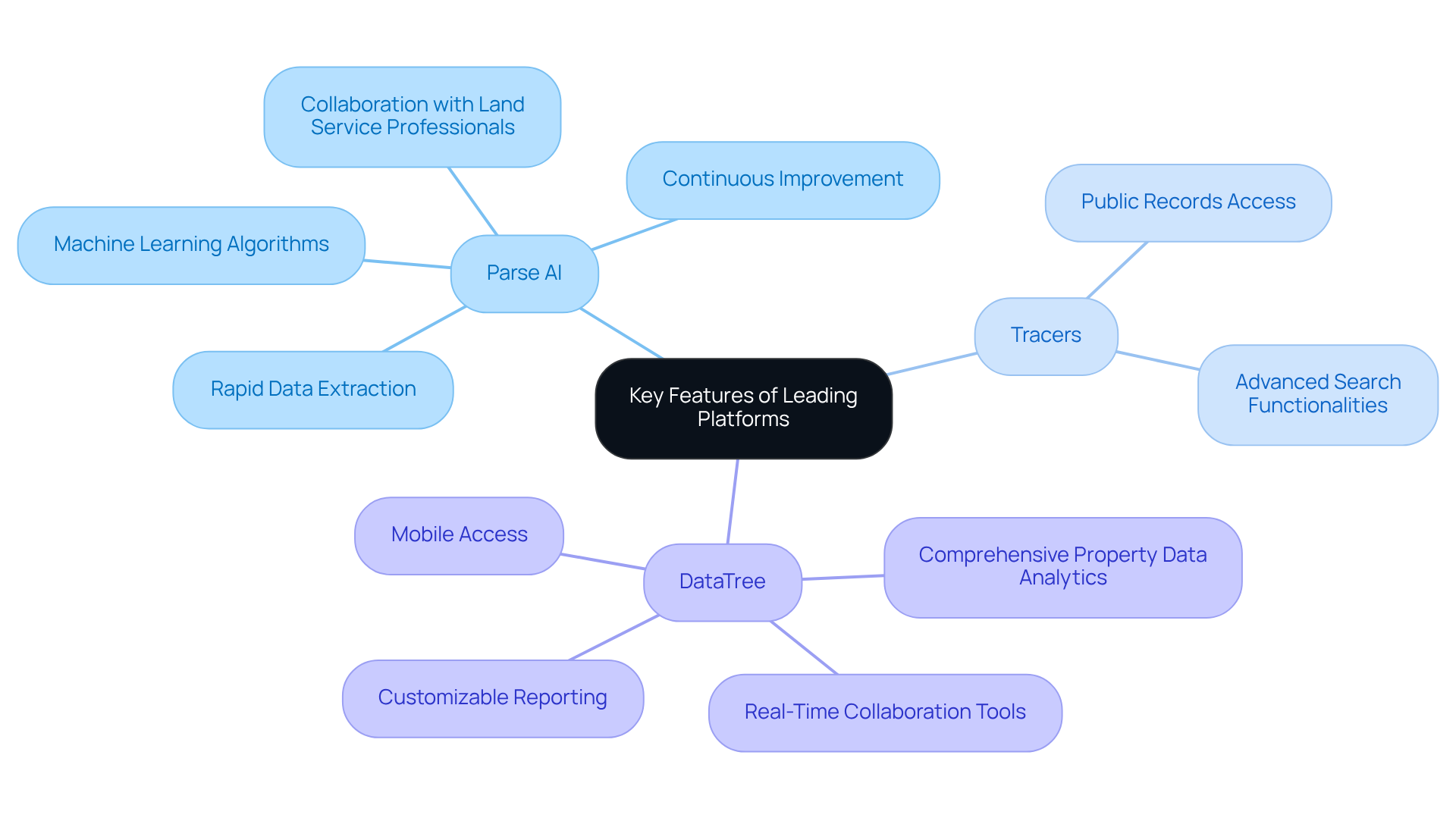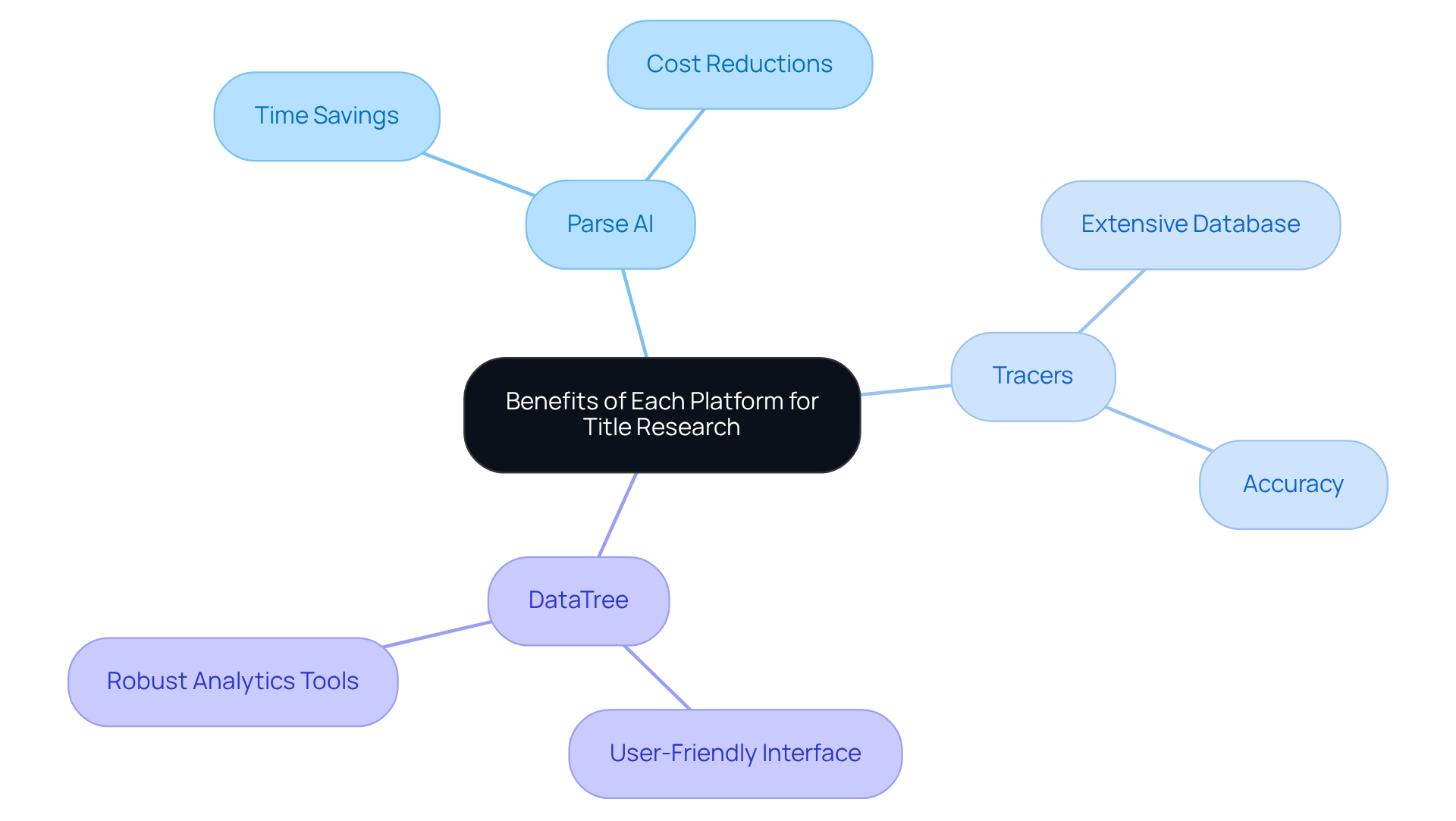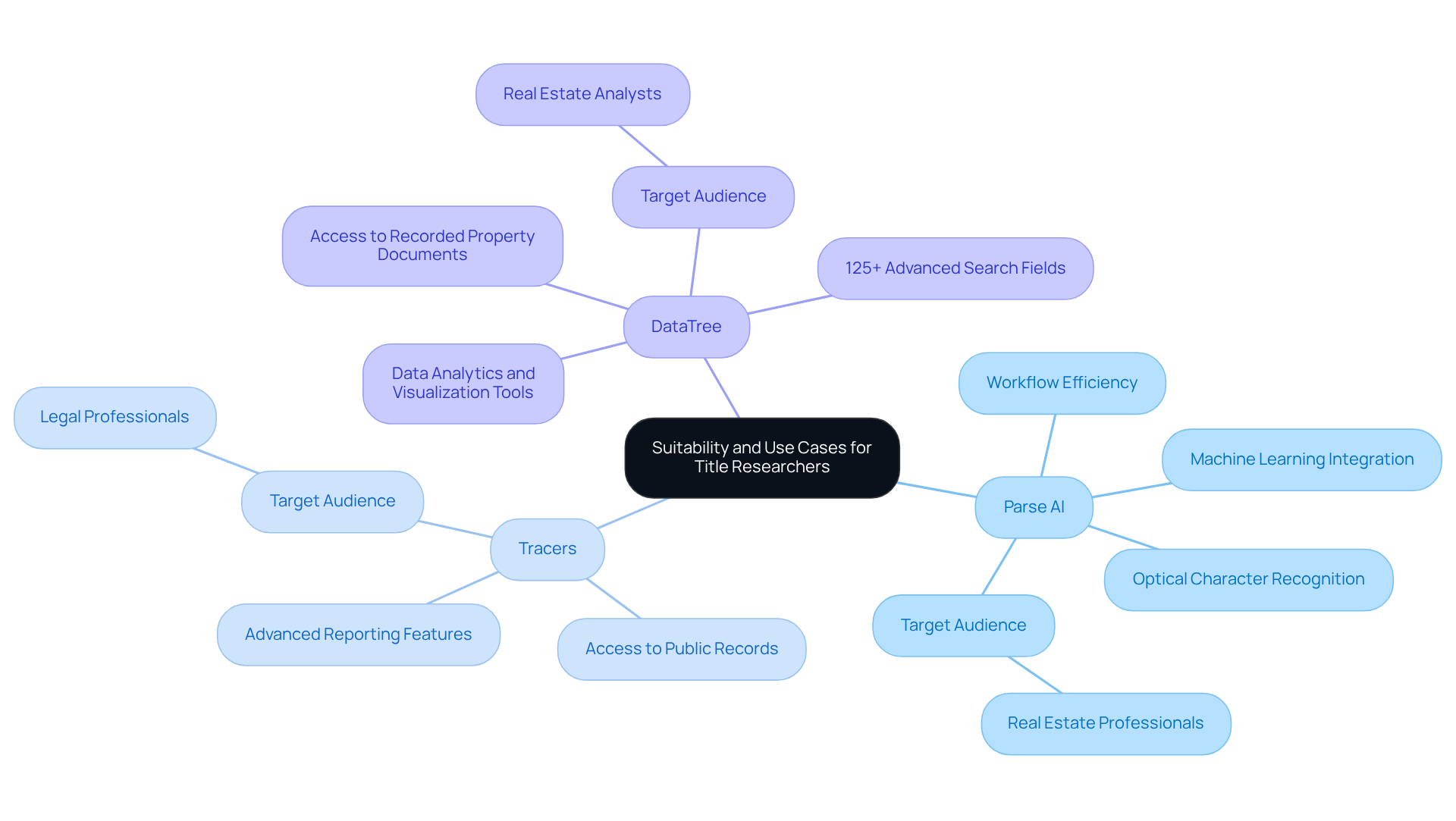Overview
This article provides a comprehensive comparison of various property document search platforms designed for title research, underscoring their unique features and benefits. Such insights are invaluable for real estate professionals seeking the most suitable option.
The significance of accurate title research cannot be overstated, as it directly impacts the reliability of real estate transactions. However, professionals often encounter challenges in navigating the complexities of title research.
Advancements in technologies like machine learning and Optical Character Recognition (OCR) have revolutionized this landscape, enhancing both efficiency and accuracy. Platforms such as Parse AI, Tracers, and DataTree emerge as frontrunners, each offering distinct advantages tailored to diverse research needs.
Furthermore, these platforms empower professionals to make informed decisions, ultimately streamlining the title research process and reducing potential risks. Consequently, leveraging these advanced tools not only simplifies the workflow but also reinforces the credibility of the research conducted.
Introduction
The landscape of property document search platforms is evolving rapidly, driven by technological advancements that promise to streamline the title research process. As real estate professionals increasingly adopt automated systems, it becomes essential to understand the unique features and benefits of these platforms to maximize efficiency and accuracy in their work. However, with numerous options available, navigating the complexities of selecting the right tool—one that meets their needs and enhances their overall research capabilities—poses a significant challenge.
Overview of Property Document Search Platforms
The terrain of has undergone a remarkable transformation, driven by the integration of that significantly enhance the research process. These systems leverage (OCR) to automate the extraction of vital information from extensive document collections, thereby improving both efficiency and accuracy.
distinguishes itself through its dedication to . Furthermore, as the adoption of in research continues to rise, forecasts indicate that by 2030, 50% of service requests will be initiated by machine users. Consequently, the evolution of these systems is set to redefine industry standards.
According to industry experts, the is substantial, particularly through property document search platforms, as it not only boosts but also with .

Key Features of Leading Platforms
Prominent play a crucial role in enhancing the effectiveness of ownership research. For instance, stands out with its rapid , powered by , which significantly reduces the time required to finalize . Furthermore, Tracers provides robust access to public records and boasts , while DataTree emphasizes comprehensive property data analytics. Additionally, property document search platforms may provide features such as:
- Real-time collaboration tools
- Mobile access
These features effectively address the diverse needs of . Assessing these characteristics is essential for specialists to select the most suitable system for their specific assignments.

Benefits of Each Platform for Title Research
Each offers unique advantages designed for the needs of . For instance, Parse AI offers through its , allowing professionals to focus on more . Furthermore, Tracers is esteemed for its , making it ideal for thorough record investigations. In addition, DataTree features a coupled with robust analytics tools, which can significantly . By understanding these advantages, individuals engaged in document examination can select property document search platforms that align with their workflow and enhance their overall efficiency.

Suitability and Use Cases for Title Researchers
The efficiency of is crucial for property researchers. Parse AI, for example, excels in and reducing turnaround times for document inquiries, making it an ideal choice for firms aiming to . In contrast, Tracers serves legal professionals by providing extensive access to public records and , essential for thorough legal analysis. Furthermore, DataTree stands out for real estate analysts, offering powerful data analytics and visualization tools that facilitate . Notably, DataTree stands out among property document search platforms by providing access to more recorded property documents than any other real estate data provider, including over 125 advanced search fields that allow users to refine their searches effectively.
By assessing the specific use scenarios for each system, specialists can strategically choose options that significantly enhance their operational effectiveness and precision. However, it is also vital to consider potential limitations of each platform, such as the learning curve associated with advanced features or the cost implications of extensive data access. This tailored approach not only but also ensures that researchers can adeptly .

Conclusion
The landscape of property document search platforms has undergone a significant transformation, equipping real estate professionals with sophisticated tools to elevate their title research endeavors. By leveraging technologies such as machine learning and optical character recognition, these platforms facilitate streamlined information extraction, thereby enhancing both the efficiency and accuracy of the research phase. As the industry increasingly embraces these innovations, the future appears promising, with projections suggesting a substantial evolution in the initiation and management of service requests.
Throughout this article, we have highlighted various platforms, including Parse AI, Tracers, and DataTree, each known for its distinctive features and advantages.
- Parse AI stands out for its automation and workflow optimization capabilities.
- Tracers offers extensive access to public records.
- DataTree provides robust analytics tools.
Recognizing these differences enables property specialists to choose the platform that best aligns with their specific requirements, ultimately improving their research capabilities and operational efficiency.
As the demand for effective title research tools continues to rise, the criticality of selecting the appropriate property document search platform cannot be emphasized enough. By assessing the strengths and applicable use cases of each system, professionals can significantly enhance their productivity and decision-making processes. Embracing these advanced platforms will not only streamline workflows but also empower researchers to navigate the intricacies of title research with greater confidence and precision.
Frequently Asked Questions
What are property document search platforms?
Property document search platforms are systems designed to enhance the research process related to property documents by leveraging advanced technologies such as machine learning and optical character recognition (OCR).
How do these platforms improve the research process?
They automate the extraction of vital information from extensive document collections, which improves both efficiency and accuracy in the research process.
What distinguishes Parse AI from other platforms?
Parse AI is dedicated to optimizing workflows specifically for real estate professionals, setting it apart from other property document search platforms.
What is the future forecast for machine learning in service requests?
By 2030, it is forecasted that 50% of service requests will be initiated by machine users as the adoption of machine learning in research continues to rise.
What is the overall impact of AI on property document search platforms?
AI significantly boosts operational efficiency and reduces the time and costs associated with traditional research methods in the property industry.




